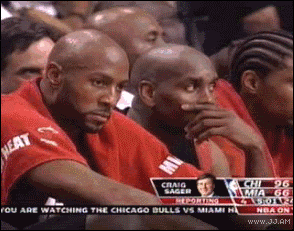bwgood77 wrote:Westbrook obviously adds more than he takes away, and without two historically good teams this year, I think they'd be right in the mix, but as Bill Simmons pointed out last night, he is the 4th worst 3 pt shooter of all time who has taken more than 1,500 (less than 30%). Of course Kobe isn't much better in that respect, and he was the best player on some championship teams.
Westbrook is so good with assists and rebounds that he makes up for it though imo. Last night they shot terribly. As for Harden, you are right to some extent but also they played better the two years after him in the regular season, only to have terrible injuries in the playoffs (Westbrook in year one and Ibaka in year two, and they still took the champion Spurs to 7 games as the lower seed without him for much of the series).
I think their bigger problem is having subpar role players around those two.
Westbrook is a force of nature and a terrific player, and a team can be a perennial contender with him. But in close situations in the playoffs, the little things come into greater focus. Westbrook plays a borderline-reckless/All-Star Game style of basketball that results in poor shot selection, poor decisions, and poor execution a little too often. While Kobe Bryant has long been an overrated three-point shooter, he has actually looked good in that area compared to Westbrook. Westbrook's turnover rate is also very high, and although he improved somewhat this season, his career assists-to-turnover ratio is quite poor for a point guard. Two years ago, he fared terribly in overtime sessions in the playoffs as the Thunder went 1-4 in those situations. Playing all but the final six seconds of those five overtime periods, Westbrook combined to score 3 points in 24:54 of playing time, shooting 1-21 (.048) from the field, 0-7 (.000) on threes, and 3-5 (.600) from the free throw line. Sure, he grabbed 10 rebounds in those five overtime sessions—the energy, effort, and athleticism were there. But the shot selection and ability to play within a flow in half-court situations, which are what close playoff games and overtimes usually come down to, were much more questionable.
Regular season basketball is one thing, but Harden gave Oklahoma City incredible versatility and made them less dependent on Westbrook's shot-out-of-a-cannon style. In the playoffs, being too predictable offensively can be deadly.
Also, Harden was just coming into his own in 2012. Had the Thunder kept him, the team's recent regular season records could have proved even better. Certainly, the team could have been better this year with Harden, as it blew fourteen fourth quarter leads in the regular season.
There has been some variance to the Thunder's role players over the years, but they have also possessed some solid pieces. Even now, one could do much worse than Serge Ibaka and the Steven Adams/Enes Kanter combination up front.
Oklahoma City is a very good club, but I do not see the Thunder as being a top-of-the-league type of team in most any year. With the staggering amount of parity and mediocrity in the NBA right now (beyond the top couple of clubs), Oklahoma City also could have posted a swollen or inflated record, like Golden State or San Antonio, if the Thunder was good enough. Actually, Oklahoma City’s record may be a little inflated by all this parity and mediocrity (outside of the very top teams), too.
Again, Westbrook is an elite guard and a historic one in certain respects. But he can be something of a bull in a china shop, and winning a championship with a bull in a china shop at point guard may be an oxymoron—if you are too dependent on him. Harden’s presence would have allowed Oklahoma City to be more flexible in its half-court sets and foster needed diversification.
Frankly, Game Three on Friday night constituted a perfect example. With the score tied at 88 and less than five minutes remaining in the fourth quarter, Westbrook found himself guarded by LaMarcus Aldridge on a switch off the pick-and-roll, high on the left wing. There were still at least six seconds remaining on the shot clock, and Aldridge was all over Westbrook, not giving him any air space out at the three-point line. Nonetheless, Westbrook—a .296 three-point shooter on the regular season and a .302 three-point shooter for his regular season career—attempted a step-back three over Aldridge.
To be sure, Westbrook had buried a step-back three a couple of minutes earlier, but that one had come against a mid-sized defender, Danny Green, and Westbrook had enjoyed greater space. And Westbrook had nailed a step-back three in the third quarter off a switch against the 6’10” Tim Duncan, but Duncan is forty years old and Westbrook was able to create sufficient air space. This attempt, conversely, came against a highly mobile, 6’11” thirty-year old, with Aldridge all the way up on Westbrook, giving him no space late in the fourth quarter of a tie-game. Naturally, Westbrook missed, as one would have predicted based on the type of shot.
The playoffs, and the goal of winning a championship, magnifies the little things—decision-making, shot selection, the ability to make effective reads of matchups, situations, and floor dynamics, and the importance of every possession. Sheer talent is no longer enough. And the little things are where Westbrook struggles, along with an ability or willingness to play the percentages. In baseball, Greg Maddux once said that he viewed pitching as analogous to gambling at a casino: overall, the odds win out—not in every instance, but on average. Basketball is like that, too: there are exceptions, but on average, bad shots do not go in and reckless risks do not pan out. The exceptions end up faltering to the rule, which is why discipline results in championships. And Westbrook, for all his breathtaking athletic talent and ability to pile up numbers and even carry a club in the regular season, remains an undisciplined and imprecise point guard.
A little over a minute later, Westbrook forced a pass to the roll man (Serge Ibaka) off the pick-and-roll by failing to create a passing lane and not looking to rotate the ball to the weak side or re-do the play, letting Ibaka come back and re-set the screen. About ninety seconds later, Westbrook failed to protect the ball off the dribble and committed his third turnover of the quarter.
And these sorts of bad decisions and failures to execute in the half-court were not aberrant; they happen routinely with Russell Westbrook.
Of course, the fourth quarter also saw what renders him an elite guard. On one play, he galloped toward the hoop in transition and scored over a defender; on another, he drew a shooting foul in a similar situation and nailed his free throws. Indeed, Russell Westbrook, with his speed, good size, long strides, and ability to elevate, may constitute the most unstoppable scoring point guard in fast break situations that the game has ever seen.
On another play late in the fourth quarter, he slammed back a teammate’s miss with a two-handed jam. (Point guards generally are supposed to get back on defense to protect against uncontested fast breaks, not to go to the offensive glass, but Westbrook’s extraordinary athleticism makes some chances in that regard worthwhile.)
Nonetheless, erratic decision-making and execution from a star point guard can hamstring a club’s championship hopes, and these patterns have long existed and remain very much evident with Russell Westbrook. He is a “superstar,” yet is he a great player? The answer rests with one’s definition, but he lacks the basketball intelligence of a great point guard.
Of course, if Westbrook plays well in Game Four this afternoon and leads Oklahoma City to a victory with a triple-double, the media will rant and rave about the triple-double …



















